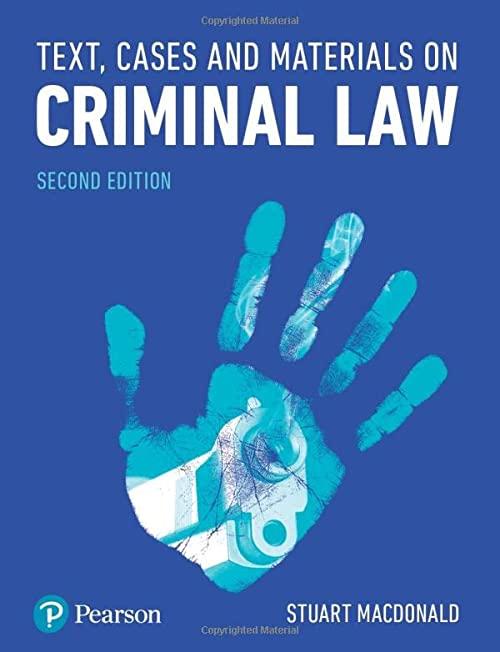Question
Assignment Instructions The Bedford case reveals how constitutional rules like the protection of the security of the person in section 7 of the Charter can
Assignment Instructions
The Bedford case reveals how constitutional rules like the protection of the "security of the person" in section 7 of the Charter can limit Parliament's criminal law power. The court held that the laws criminalizing various aspects of prostitution were unconstitutional because they impaired the safety and survival of sex workers. First, the "communicating provision" caused sex workers to work in secluded parts of urban areas in order to avoid police attention. It also caused sex workers to rush their interactions with potential clients, impairing safety-enhancing screening measures that sex workers would otherwise take. The provision also created an adversarial relationship between sex workers and police - rather than relying on police, sex workers had to avoid them. This was particularly problematic since the evidence was that street-based sex workers are the most vulnerable people working in the industry. The criminal law made it more likely that street-based sex workers would be injured or killed while doing sex work. The court concluded that the effects of this provision were "grossly disproportionate" - in violation of the principles of fundamental justice mentioned in section 7 - given that the purpose of the provision was to prevent "public nuisance." That purpose wasn't worth the costs.
Second, the "bawdy house" provision prevented sex workers from being able to work indoors. The evidence was clear that being indoors is the safest way to do sex work as it allows the use of closed-circuit security cameras and other security tools that are only possible in a fixed and familiar environment. The effects of this provision were "grossly disproportionate" - in violation of the principles of fundamental justice - given that the purpose of the "bawdy house" provision was to prevent "public nuisance." Again, that purpose wasn't worth the costs. Third, the "living off the avails" provision prevented sex workers from being able to hire third parties to assist them in doing sex work more safely. While the purpose of this law was to "prevent exploitation" of sex workers by so-called "pimps", it also prevented sex workers from being able to hire drivers, receptionists and security staff. For this reason, the law was "overbroad", in violation of the principles of fundamental justice. The law had a valid purpose, but its effects extended well beyond that purpose. The result of the court's decision in Bedford was that the key provisions that criminalized prostitution were struck down. But that situation didn't last long. In 2014, the Harper government passed a new bill that effectively re-criminalized prostitution: the Protection of Communities and Exploited Persons Act. The preamble to the Protection of Communities and Exploited Persons Act makes clear that the purposes of the new regime are different than the old purposes of preventing nuisance that applied to the 'communicating' and 'bawdy house' provision. The new legislation says that it aims to reduce demand for prostitution, by denouncing and prohibiting the purchase of sexual services. The new legislation also says that "it is important to protect human dignity and the equality of all Canadians by discouraging prostitution, which has a disproportionate impact on women and children." To that end, the new regime includes the following provisions. Let's consider if the new laws abide by the court's concerns in Bedford. (1) Obtaining sexual services for consideration: s. 286.1 The new bill adds s. 286.1 to the Criminal Code, which says "Everyone who, in any place, obtains for consideration, or communicates with anyone for the purpose of obtaining for consideration, the sexual services of a person is guilty of" an offence. This new provision criminalizes everyone in any place who purchases or communicates in order to obtain sexual services. While the seller of sex can't be prosecuted under this provision, the client remains criminalized and thus the industry continues to function underground. This provision adds mandatory fines to all violations. Sanctions include mandatory minimum fines ranging from $500 to $4,000, and can include up to five years in jail. These new mandatory fines are higher for repeat offenders and for anyone who purchases sex in a place where a person under 18 could reasonably be found.
(2) Communicating to provide sexual services for consideration: s. 213(1.1) The new bill also adds s. 213(1.1), which says "Everyone is guilty of an offence punishable on summary conviction who communicates with any person for the purpose of offering or providing sexual services for consideration in a public place, or in any place open to public view, that is or is next to a school ground, playground or daycare centre." This provision does criminalize sex workers, particularly those who do street-based sex work in a public place of this type. 2.1. Task #1: Initial Post Imagine that you are a lawyer representing a group of sex workers who wish to challenge these two provisions. Your clients want to argue that the holding in Bedford makes clear that criminalizing sex work is unconstitutional where it stands in the way of safety-enhancing measures for sex workers. Drawing from the court's analysis in Bedford, what arguments would you make about these two new provisions? Be sure to identify any evidence that might be helpful in order to make your argument.
Step by Step Solution
There are 3 Steps involved in it
Step: 1

Get Instant Access to Expert-Tailored Solutions
See step-by-step solutions with expert insights and AI powered tools for academic success
Step: 2

Step: 3

Ace Your Homework with AI
Get the answers you need in no time with our AI-driven, step-by-step assistance
Get Started


